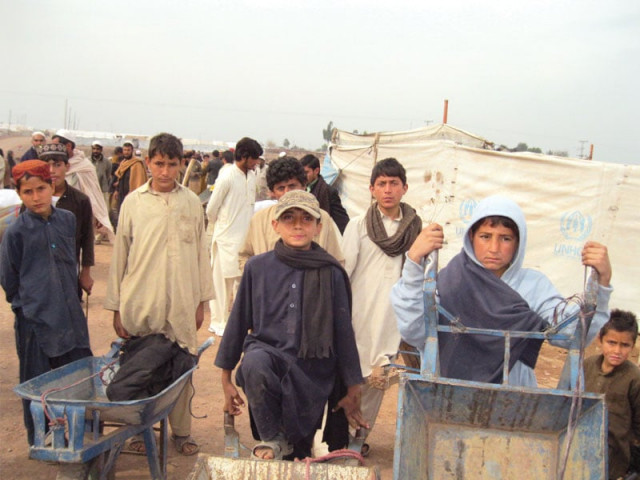Displaced families: In Jalozai camp, child labour costs Rs250 a day
Over 100 children under the age of 15 lug heavy food rations for less than Rs50 per load.

A majority of young porters are orphans who have no other sources of income. Many do not attend school because they have to make a living. PHOTO: EXPRESS
Fazal Amin, 10, gazes at the gaggle of experienced child labourers waiting for ration-distribution at Jalozai camp, and after some deliberation, says he is uncertain of his future and of what he wants to be when he grows up.
These 123 odd child labourers (below the age of 15) provide porter services to camp dwellers – mostly displaced people from Bara, Khyber Agency – carrying heavy ration in wheel barrows to their tents. They are usually paid between Rs30 and Rs50 per customer.
“I go to school but I am working in place of my brother who fell ill,” Fazal told The Express Tribune on his first day as a porter. “My father died of cancer three years ago and I have two sisters and two brothers.”
He was a grade two student and already knew his place in the pecking order, while the rest of the boys were seasoned in haggling and fighting for customers.
Some 14,000 displaced families – 70,000 individuals including 40,000 children – were living in Jalozai Camp according to statistics from March 2012, confirmed a Provincial Disaster Management Authority (PDMA) official.
Most of them fled Bara as security forces attempted operations to weed out militants, who are hard to distinguish from ordinary tribesmen.
As soon as ration supplies reached the food-distribution point, a group of 30 children rushed to make a grab for their edible load: 40-kilogramme (kg) flour sacks; bags of sugar, pulses and rice; biscuits and five-litre cooking oil packages weighing approximately 55 kg.
For most of the underage eager labourers, the weight of their laden wheelbarrows was more than they could easily manage.
A child protection NGO Centre of Excellence for Rural Development’s (CERD) Manager Maqsood Khan said they would identify children in the camp and encourage them to attend school and vocational training.
“Our teams visit families and persuade them to send their children to schools but it’s a struggle to do so because children financially support their families,” he added.

The camp houses 1,191 orphans, including 483 females, 157 children with disabilities and 23 children who have no family and live with foster carers or relatives.
A majority of the young porters were orphans with no other source of income. According to Khan, the camp has established schools and vocational centres for children, but as soon as relief organisations are on ground for goods distribution, attendance falls.
“If we go to school, what will we eat?” questioned a child standing next to the CERD manager. Usman Ali, 12, and his brother work from dawn to dusk at the camp to earn Rs250 to 300 per day. For him, attending school and skipping his daily wages was a moot point.
“The frequency of fleeing families is dramatically increasing despite harsh weather,” said camp coordinator Muhammad Khalid. He pointed out though many organisations were working to protect children’s rights they could not force anyone to send their children to school.
He admitted it was near impossible to stop child labour as children have to work one way or the other to provide for their families.
Society for the Protection of the Rights of the Child (SPARC) Programme Manager Imran Takkar said militancy, a lack of education facilities and high inflation rates have caused a spike in child labour in Khyber-Pakhtunkhwa.
Though the federal and provincial government cannot provide concrete data at the moment, recent estimates indicate approximately 11 to 12 million children are employed across the country.
Half of them are below the age of 10. “This is a serious cause for concern as underage employment undermines a child’s physical and emotional development and reduces chances of a brighter future,” Takkar said.
Though the children working at the camp are all boys, it is worth bearing in mind young girls at the camp also miss out on educational opportunities. In addition to schools and vocational centres, the camp has child-friendly spaces with games and toys. Yet, most families do not send their girls far from their tents.
Published in The Express Tribune, February 6th, 2013.













COMMENTS
Comments are moderated and generally will be posted if they are on-topic and not abusive.
For more information, please see our Comments FAQ